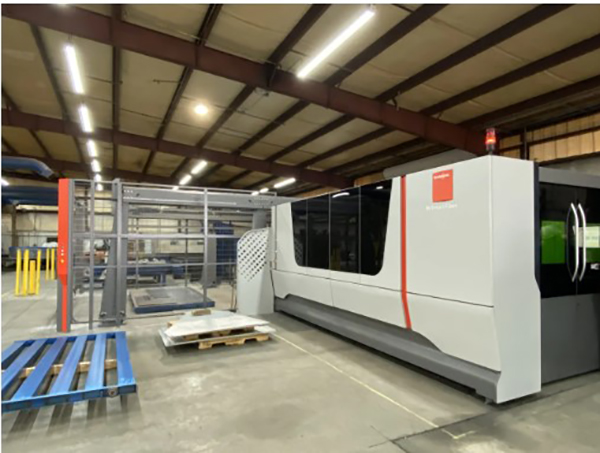Laser cutting

Laser cutting
Over the past 10 years laser cutting has developed into modern trailblazing technology. Nowadays over 40,000 cutting systems are used for high-power plate processing worldwide.
Laser cutting is able to cut faster and with higher quality than its competitors (waterjet cutting, flame cutting, and plasma cutting). It is very efficient in many fields where speed is important and the machines can cut a wide range of materials. The results are always precise and neat without deterioration of the material.
The Machines
(1) By Smart Fiber Laser with Automation
- 10,000 watt fiber laser
- 60″ x 120″ cutting area
- auto load and unloading system
- ability to cut 10,000 lbs. of material unmanned
The Capabilities
- Cuts up to 3/4″ thickness in carbon and alloy
- Cuts up to 3/4″ half inch thickness in stainless steel and three eights aluminum
- Cuts up to 3/4″ thickness in armor plate
- Standard cutting tolerance of +.005
- Auto load and unload system
The Process
The laser cutting process is a controlled way to burn through materials.
The cutting tool works by directing high energy lasers through optics. Then the laser beam is produced on a small area of the material. The beam of light heats up the metal and melts the material.
The material is then melted, burned, or vaporized by the narrow beam. This is only successful if the laser cutters completely penetrate the material used.
The cutting gas is applied to cool and protect the lens and remove the melted metal from the cut kerf. (Kerf is the amount of material that is removed when cutting. Laser cutting has a very small kerf compared to other cutting methods.)
CO2 lasers, gas lasers, and solid state lasers are the most common used in plate processing.
Simple version: Imagine taking a really small blow-torch and attaching it to a robotic arm that is controlled by a computer.
The Benefits
- Low distortion and dimensional accuracy
- Little to no burning, resulting in a fairly clean kerf or cut edge,and often elimination secondary processing
- Computer aided component nesting of components produces more jobs out of each material sheet
- Rapid and inexpensive prototyping due to no hard tooling
- Narrow heat affected zone